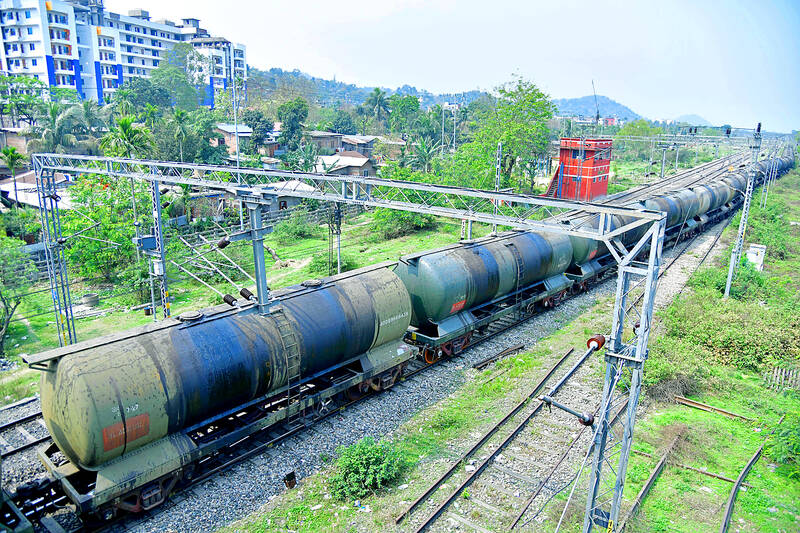The EU should crack down on India reselling Russian oil into Europe as refined fuel, including diesel, EU High Representative for Foreign Affairs and Security Policy Josep Borrell said in an interview with the Financial Times.
India has in the past year emerged as a top buyer of Russian oil following Moscow’s invasion of Ukraine in February last year.
Access to cheap Russian crude has boosted output and profits at Indian refineries, enabling them to export refined products competitively to Europe and take a bigger market share.

Photo: AFP
Borrell told the newspaper that he would raise the issue with Indian Minister of External Affairs Subrahmanyam Jaishankar in their meeting set for yesterday.
“If diesel or gasoline is entering Europe ... coming from India and being produced with Russian oil, that is certainly a circumvention of sanctions and member states have to take measures,” the EU’s chief diplomat said.
“That India buys Russian oil, it’s normal... But if they use that in order to be a center where Russian oil is being refined and by-products are being sold to us ... we have to act,” Borrell said.
Indian refiners, which rarely bought Russian oil previously due to high transport costs, imported 970,000 to 981,000 barrels per day from Russia in fiscal 2022-2023 (April to March), accounting for more than one-fifth of the country’s overall fuel imports.
Russia’s largest oil producer PJSC Rosneft Oil Co and top Indian refiner Indian Oil Corp have also signed a term deal to substantially increase and diversify oil grades delivered to India.
Ship-tracking data from Kpler showed that Reliance Industries Ltd and Nayara Energy Ltd were the key exporters of refined fuels and buyers of Russian oil.
India typically exported an average of 154,000 barrels per day of diesel and jet fuel to Europe before Russia’s invasion of Ukraine. However, that has increased to 200,000 barrels per day after the EU banned Russian oil products imports from Feb. 5 this year, Kpler data showed.
Any mechanism to stem the flow of Russian oil would need to be implemented by the national authorities, Borrell told the Financial Times, suggesting that the EU could target buyers of Indian refined fuels which it believes are derived from Russian crude.
“If they sell, it is because someone is buying, and we have to look at who is buying,” he said.

Vincent Wei led fellow Singaporean farmers around an empty Malaysian plot, laying out plans for a greenhouse and rows of leafy vegetables. What he pitched was not just space for crops, but a lifeline for growers struggling to make ends meet in a city-state with high prices and little vacant land. The future agriculture hub is part of a joint special economic zone launched last year by the two neighbors, expected to cost US$123 million and produce 10,000 tonnes of fresh produce annually. It is attracting Singaporean farmers with promises of cheaper land, labor and energy just over the border.

US actor Matthew McConaughey has filed recordings of his image and voice with US patent authorities to protect them from unauthorized usage by artificial intelligence (AI) platforms, a representative said earlier this week. Several video clips and audio recordings were registered by the commercial arm of the Just Keep Livin’ Foundation, a non-profit created by the Oscar-winning actor and his wife, Camila, according to the US Patent and Trademark Office database. Many artists are increasingly concerned about the uncontrolled use of their image via generative AI since the rollout of ChatGPT and other AI-powered tools. Several US states have adopted

A proposed billionaires’ tax in California has ignited a political uproar in Silicon Valley, with tech titans threatening to leave the state while California Governor Gavin Newsom of the Democratic Party maneuvers to defeat a levy that he fears would lead to an exodus of wealth. A technology mecca, California has more billionaires than any other US state — a few hundred, by some estimates. About half its personal income tax revenue, a financial backbone in the nearly US$350 billion budget, comes from the top 1 percent of earners. A large healthcare union is attempting to place a proposal before

KEEPING UP: The acquisition of a cleanroom in Taiwan would enable Micron to increase production in a market where demand continues to outpace supply, a Micron official said Micron Technology Inc has signed a letter of intent to buy a fabrication site in Taiwan from Powerchip Semiconductor Manufacturing Corp (力積電) for US$1.8 billion to expand its production of memory chips. Micron would take control of the P5 site in Miaoli County’s Tongluo Township (銅鑼) and plans to ramp up DRAM production in phases after the transaction closes in the second quarter, the company said in a statement on Saturday. The acquisition includes an existing 12 inch fab cleanroom of 27,871m2 and would further position Micron to address growing global demand for memory solutions, the company said. Micron expects the transaction to